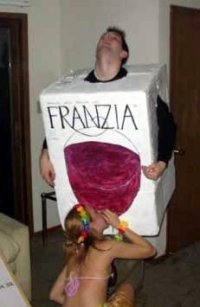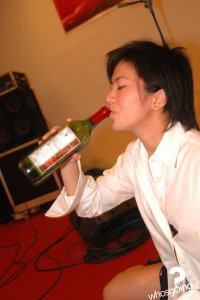With the cost of everything from glass bottles to gasoline increasing, some Bucks County wineries are looking for creative ways to save money so they can avoid scaling back production or raising prices.
They're cutting out the middleman, joining forces to buy materials in bulk and, in the case of the Fratelli Desiato Vineyards in Bedminster, installing solar panels, wind turbines and cisterns that capture rainwater to irrigate fields and wash equipment.
"We did it because of the economy," owner Lou Desiato said of his vineyard's new "green" amenities. "We were trying to cut some of our overhead."
The changes have helped lower the winery's electric and water bills, he said.
"We're watching every penny," he said. "We're closed on Mondays and Tuesdays because there's not enough business to support it."
Costs have risen and business has slipped at the vineyard's restaurant and tavern, but Desiato said the winery will still produce "a few thousand bottles" of wine this year about the same as last year.
"People are more price conscious," he said. "But our private events are still good, which is helping us weather the storm."
Wine is a $661 million industry in Pennsylvania. The state is the nation's fifth-largest producer of wine grapes in the U.S., according to the Pennsylvania Winery Association.
Though local wineries are susceptible to higher prices for ingredients and supplies and subject to slowing demand during tough economic times, some area vineyard owners say they're going to be just fine.
"People are staying local and buying local and we have a ton of local customers," said Tom Carroll Sr., co-owner of Upper Makefield's Crossing Vineyards and Winery, which added solar panels last year.
is even ripe for expansion, said Carroll.
The business plans to open a retail location in the Marketplace at East Falls on Ridge Avenue in Philadelphia, he said. Plus, Carroll said he expects the winery to increase production and build an addition to give it more storage space.
"We're still doing well," agreed Jerry Forrest, patriarch of Buckingham Valley Vineyards. "We get a lot of business from the Philly metro area in a 20- or 30-mile radius."
He added that wine lovers are likely to continue making purchases despite economic concerns. "To some degree, I think we're cushioned because we deal with a unique clientele," he said increasing.
"Our costs are up, but we're trying to do things smarter," Carroll said. "(Our) expansion actually helps because we're buying (supplies) in bigger quantities."
Petroleum-based fuels are needed to produce the glass used in wine bottles and some types of labels, so those costs have gone up significantly, vineyard owners said. Crossing Vineyards recently switched glass suppliers to get a better deal and the business uses labels that aren't petroleum-based.
Desiato added that his vineyard has joined forces with Peace Valley Winery in New Britain Township to make some supply purchases together to get a better price.
Tinicum's Sand Castle Winery grows all its own grapes, which cuts down delivery costs. But winery vice president Joseph Maxian said it's still costing more to keep the tractors running and get other materials they need to operate.
"If they get an excuse to raise prices, they will," Maxian said of suppliers. "We haven't changed our prices since last year. We're hanging on."
Sand Castle, which celebrates its 20th anniversary this year, has faced an additional challenge: portions of nearby River Road have been closed for repairs due to several floods during the last few years.
Like Crossing Vineyards, Sand Castle plans to increase production when a new vineyard it has cultivated in recent years begins to bear fruit. The winery currently produces between 24,000 and 36,000 gallons of wine per year. It charges $13to $30 per bottle.
"We're going through the challenge of an energy crisis and unknown economics, but the farmer is always optimistic and always looking to next season," said Maxian.
JOHN ANASTASI
skip to main |
skip to sidebar
Enhance the pleasure that you get from wine by sharing your experiences, knowledge, news articles and facts about the elixir of the gods and bacchanalia on earth by emailing: bacchusforyou@bellsouth.net
How Much Did The Best Bottle of Wine You Ever Drank Cost?
CONTACT INFORMATION
TO SUBMIT A POST, TO BE PUT ON THE MAILING LIST, TO HAVE QUESTIONS ANSWERED, ETC.
EMAIL:



